Fire Breaks Out At Warehouse Of Iranian Manufacturer In Mashhad
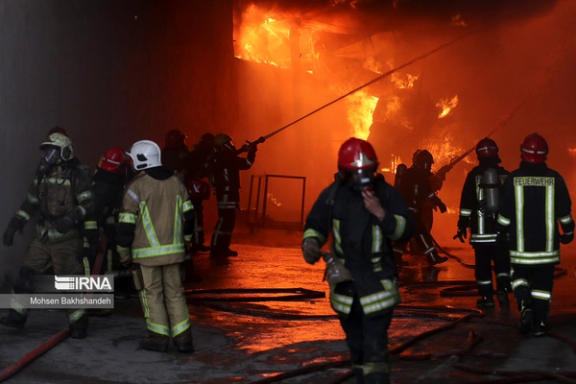
Media in Iran reported Tuesday that a large fire broke out at three warehouses of a home appliances manufacturer in the northeastern city of Mashhad.

Media in Iran reported Tuesday that a large fire broke out at three warehouses of a home appliances manufacturer in the northeastern city of Mashhad.
The semi-official ISNA news agency reported midday local time that the warehouses belonged to Electrosteel, a large and well-known company in Iran.
"There are currently 100 firefighters at the scene. Due to the extent of the fire and thickness of the smoke, there is no information regarding potential victims," added ISNA.
60 fire trucks and water tankers arrived at the site to prevent the fire from spreading to the nearby warehouses and the gas tank of the factory.
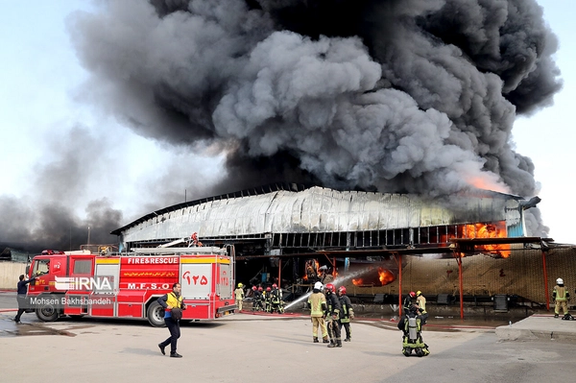
According to fire department officials, the warehouses occupy an area of approximately 2,000 square meters and part of them were destroyed due to the large volume of the blaze.
The official cause of the blaze has not been announced yet.

There have been a number of explosions and fires near Iran’s military, nuclear and industrial facilities in recent years.
On January 28, a huge fire erupted at an Iranian military industry factory following a suspected drone strike in the central city of Esfahan.
Iran blamed Israel for the drone attack vowing revenge.
On the same day, another large blaze also engulfed an industrial area near the city of Tabriz, northwest Iran. The government said the fire started at a refinery producing motor oil.

Amnesty International has urged Iran’s Chief Justice to revoke the "unjust conviction" of Jamshid Sharmahd, an opponent of the Islamic Republic, and to revoke his death sentence.
In a letter on Monday to Gholamhossein Mohseni Ejei, Amnesty said German-Iranian political dissident, Sharmahd, is at risk of execution after being sentenced to death for “corruption on earth” following a grossly unfair trial.
It goes on to say that since July 2020, the Iranian authorities have been subjecting him to enforced disappearance, torture and other ill-treatment including through prolonged solitary confinement and denial of adequate healthcare.
The international rights group also urged Ejei to reveal Sharmahd’s “fate and whereabouts and, in light of his arbitrary detention, immediately release him.”
Amnesty further asked the authorities that if they do not intend to release him, at least ensure that he is given regular access to family, adequate medical care, including dental care, a lawyer of his choosing and consular assistance from the German authorities.
Sharmahd, the director of Tondar opposition group, has been held in solitary confinement for hundreds of days, and during this time, he has been denied an independent attorney and fair legal procedures.
The news of his kidnapping in Dubai and his transfer to Tehran by Islamic Republic agents was first released in August 2020. The Islamic Republic has alleged that Sharmahd was involved in a 2008 bombing on a mosque in Shiraz that killed 14 people and wounded 200 more, something he and his family vehemently deny.

Israel conducted its tenth attack this year on suspected Iranian positions in Syria in the Damascus airport area and the fourth attack in less than a week.
The attack came at 12:15 am local time and Syrian air defenses fired missiles and reportedly stopped two incoming projectiles. Syria said two civilians were killed, but neither Damascus nor Tehran announce the true number of military casualties in these attacks.
The Syrian government also said that the attack was launched from the direction of the Golan Heights.
The Syrian Observatory for Human Rights, a London-based war monitor said that explosions were heard in the areas of Qasiyon Mountain and Al-Saida Zainab area, and ambulances rushed to these areas.
Israel has been regularly attacking targets in Syria since 2017 to weaken Iran's attempts to strengthen its military presence in the war-torn country and build up a threat on Israel's northern borders.
Government-controlled media in Iran simply carried what the Syrian government had reported, without further comments. Military figures usually refer to such attacks with a delay.
Israel’s first attack in five days came on March 30, followed by another strike on March 31. Iran admitted that two IRGC “military advisors were martyred” in those attacks and vowed revenge. Some observers commented that announcing the death of two officers meant that Tehran wanted to lay the ground for retaliation.
After a third Israeli attack early Sunday, an unidentified aircraft that was trying to penetrate the Israeli air space was shot down, but it remains unclear what type of aircraft it was or whether it was Iranian. Israeli media quoted a military source as saying that apparently Iran was behind the launch of a drone, but so far the government has not officially blamed Iran.
Iran has considerable drone capabilities that it has used against US bases in Syria as recently as last month, killing a US contractor and injuring at least eight US servicemen.
Tensions rose in Syria when on March 23 Iranian backed forces attacked a US base with a drone, inflicting casualties. The US responded with an air strike, which was followed by more attacks on US forces. The tit-for-tat strikes stopped after two days, but Iran has targeted US forces in Iraq and Syria 80 times since early 2021 when the Biden administration assumed office.
Israeli Defense Minister Yoav Gallant warned Iran in the context of agitating Palestinians to conduct more attacks. "We will not allow the Iranians and Hezbollah to harm us. We have not allowed it in the past, we won’t allow it now, or anytime in the future," Gallant said during the visit to an army brigade in the West Bank on Sunday.
"All our fronts are tense. The Iranians are extending their outreach to (the West Bank) and Gaza and are attempting to entrench themselves in Syria and Lebanon," said Gallant.
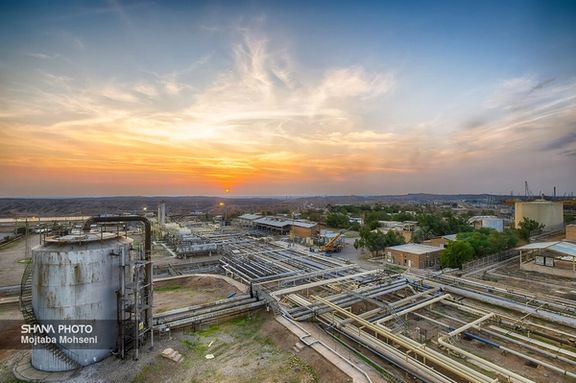
Systematic corruption is not something new in Iran's oil-dependent economy but recently criticism over the government’s energy management is increasing.
The situation has been grave in the past several years but since the administration of Ebrahim Raisi assumed office in 2021, the entire energy management system is going haywire even faster, drawing backlash from people and even regime officials.
Iran has one of the biggest reserves of oil and natural gas and its economy is chiefly dependent on the revenues from crude oil exports. But due to sanctions and mismanagement it has failed to modernize its electricity sector and the country faces power shortages most of the year.
The regime has a hypocritical approach about the sales of fuel to foreign buyers. While it boasts about the growing level of sales, which mainly occur through vast networks of smugglers under the unofficial supervision of the Revolutionary Guards, it periodically claims to have stopped traffickers from smuggling some shipments of gasoline and diesel out of the country.
The oil-rich country has been facing a serious scarcity of gasoline in its domestic energy market because fuel is subsidized in Iran and much cheaper than in neighboring countries, which leads to small and large scale smuggling.
The country also faces gasoline and diesel shortages due to a lack of refining capacity, but millions of liters of fuel is smuggled out of Iran daily, which betrays a large-scale smuggling networks.

In a recently released video, Iranian lawmaker Malek Shariati said "Perhaps we are ashamed to admit that 1.5 billion liters of liquid fuel are smuggled from our power plants per year.” He added that the tankers carrying government-supplied cheap fuel are not unloaded at the power plants and documents are forged to cover for that. Even if the regulatory body finds out about it, the fine is so low that it is still worth it, Shariati noted, adding that most of the country’s diesel smuggling happens in power plants, implying that the owners of the power plants are responsible for the fuel smuggling in the country.
According to Mir-Ali-Ashraf Abdollah Pourihoseini, a former vice president of Ministry of Economic Affairs and head of the Iranian Privatization Organization, in recent years, many key power plants have been handed over to insider investors because the government did not have the needed budget to overhaul them. However, the new owners did not take any steps to overhaul the aging plants.
But who are these new owners? For instance, Abadan power plant with a capacity of 814 megawatts was handed over to the Headquarters of Imam's Directive, or simply Setad, parastatal organization under direct control of the Supreme Leader.
Zagros power plant with a capacity of 656 megawatts was handed over to the Foundation of Martyrs and Veterans Affairs at the price of less than 8 trillion rials – or about $16 million dollars in today’s exchange rate. Khatam al-Anbiya Construction Headquarter -- the engineering arm of the IRGC – acquired Sabalan power plant with a 960-megawatt capacity at a price of about $8 million. The Armed Forces Pension Fund and Social Security Investment Company bought Gilan power plant, and the list goes on.
Public property has been “privatized” by giving away key infrastructure to powerful cliques of military men and bureaucrats who easily enrich themselves.
Moreover, In the budget bill for the current Iranian year, which started March 21, the government has granted new permits to some departments such as the General Staff of the Armed Forces of the Islamic Republic to sell oil on behalf of the government and earn some of the income. Based on the legislation, the General Staff of the Armed Forces is allowed to export three billion euros worth of crude oil and oil products through small private refineries after the approval of the country's budget organization.
Iran, which is under US oil export sanctions, has used this method before to make illicit oil shipments. However, in the past this has led to large corruption cases.
A well-publicized scandal broke in 2013 when authorities arrested Babak Zanjani, a businessman, for embezzling at least $2.7 billion from illicit oil sales during international sanctions from 2009-2013. According to legal experts, this method of allocating money to government entities violates the constitution.
Many members of Iran's hardliner dominated parliament are former members of the IRGC. Moreover, the government has started a new privatization plan to sell public assets presumably to well-connected regime insiders. Iranian media and economic experts have characterized the new privatization plan by the government as "a plunder of public property" and "economic apartheid."
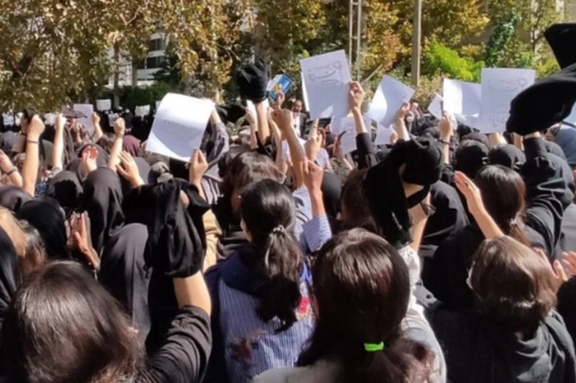
The ministry of higher education said institutions under its coverage will no longer offer educational and other services to students who do not abide by hijab rules.
“All universities and higher education institutions under the coverage of the ministry of sciences, research and technology will not be obliged to offer educational, welfare and other services to the few students who do not abide by the laws and regulations of the universities in this regard,” the ministry said in a statement Monday.
Speaking to the moderate conservative Khabar Online news website, Hassan Kia, attorney at law, said the statement is in violation of the Iranian constitution which gives every citizen the right to education and forbids government bodies from making their own laws.
Hijab defenders who rallied outside the governor’s office in Ramsar threatening to take the matter into their own hands.
“It is not clear who, and how, is going to decide whether the hijab rules have been broken or not in a university? Does letting a few locks of hair show from under a headscarf mean the rules have been broken or is it totally flouting the hijab, or putting it around one’s neck? Who is going to decide? This can cause a lot of strife in universities,” he said.
An ever-increasing number of women have been casting off their compulsory hijab for good since the beginning of the “Woman, Life, Freedom” movement six months ago but hardliners are now taking a much more aggressive approach to the issue of hijab to punish and bring these women under control.
“The issue of compulsory hijab is so intertwined with the existence of the suppressive Islamic Republic that [it considers] even taking one step back as total defeat,” Toronto-based women’s rights researcher Leili Pourzand told Iran International TV.
A female student wearing no hijab grilling the hardliner mayor of Tehran at Sharif University in December.
Most officials and hardliners insist that flouting hijab is a crime that must be dealt with, and the ministry of interior said in a statement last week that the Islamic Republic would enforce the hijab as an “unquestionable requirement of the Sharia.” When asked about the issue a few days ago, President Ebrahim Raisi also stressed that women must abide by the hijab rules because it is “law”.
The ultra-hardliner politicians and clerics who have been demanding stricter enforcement of the hijab have also called on their supporters to actively carry out their Islamic duty of “calling to virtue and forbidding wrong”. This, however, is causing many angry encounters in between the vigilantes and women who refuse to be bullied into wearing the hijab.

Even some regime insiders who do not question the necessity of hijab as a principle are critical of the aggressiveness of vigilantes and the energy and time that the government is spending to enforce the hijab instead of addressing more vital matters such improvement of the economy, corruption, and poverty.
“I seriously believe that we are distancing ourselves from the real teachings of Islam … when authorities show more sensitivity to girls’ hair than to bribery, embezzlement, garbage scavenging, injustice and the usury that has overtaken our banks,” Moeinoddin Saeedi, representative of Chabahar in the parliament, said Monday.
Some ultra-hardliners in the parliament have taken steps to enact new hijab legislation to punish those who refuse to abide by the rules by imposing cash fines of up to $60,000 and other penalties including revocation of drivers’ licenses and passports, or a ban on the use of the internet for celebrities and social media influencers and bloggers.
Parliament Speaker Mohammad-Bagher Ghalibaf, according to one of the lawmakers behind the plan, Morteza Agha-Tehrani, has promised to help urgently pass the new hijab legislation.

Following the Russian invasion of Ukraine and the ensuing punitive measures, several countries replaced the US and Western countries as Moscow’s top exporters, but Iran lagged behind.
According to a Monday report published by 90eghtesadi, a website close to the Islamic Republic’s hardliners, Turkey, Iran, India, Brazil, and the UAE vied for a share in the Russian market, but Ankara’s exports were 14 to 18 times higher than Tehran’s.
The report claimed that Turkey's exports to Russia from February 2022 – when the war started -- to January 2023 reached nearly $10 billion, but the Islamic Republic exported only about $709 million during the timespan. Turkey’s monthly exports to Russia were about seven time more than Iran’s before Moscow’s invasion of Ukraine but increased 14 to 18 times in different months during the past year.
The data of Russia's trade with different countries show that Iran has not been able to make good use of the opportunity created by Russia's war to expand its trade ties, the report said.
According to the monthly chart published by the website, in some months, the exports of Iranian goods to Russia hit lower than the monthly exports before the Russian aggression. The released data do not include any details about the commodities imported by Russia.

The Islamic Republic did not manage to gain from the international measures aimed at further isolating Moscow but has faced several rounds of sanctions for supplying drones and missiles for the Russian invasion. Iran has supplied hundreds of Shahed and other drones to Russia since mid-2022, and although Ukraine is capable of shooting down most of the slow-moving UAVs, Russia relies on the Iranian weapon to swarm Ukraine’s air defenses.
The United States and its European allies have imposed a series of sanctions on Iranian individuals and companies involved with the drone program and shipments of the weapon to Russia. They have also warned Tehran that one of the conditions to restart nuclear talks is ending its weapons supplies to Russia. A nuclear agreement between Iran and the West could suspend most economic sanctions and boost the country’s economy.
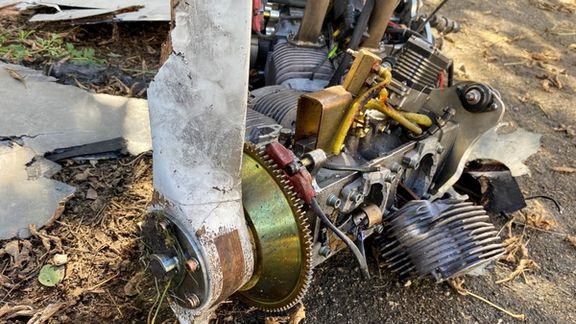
In addition to Tehran’s failure in securing a share of the Russian market, a document obtained by Iran International revealed in February that Russian companies are not willing to invest in oil and gas projects in southern Iran, despite joint plans. In a top-secret letter addressed to First Vice-President Mohammad Mokhber, Deputy Foreign Minister for Economic Diplomacy Mehdi Safari said that many development projects that were supposed to be carried out by Chinese and Russian companies have been stopped, calling on the government to take measures to re-start the projects.
Tehran keeps boasting about its long-term strategic cooperation deals with Russia and China, but such deals have not yet borne any tangible results, despite several meetings among senior officials of the countries. Iran’s Foreign Minister Hossein Amir-Abdollahian met with his Russian counterpart, Sergey Lavrov, on an official visit to Moscow late in March to exchange views on signing a long-term strategic agreement, Tehran’s nuclear issue and the war in Ukraine. Moreover, some Iranian observers suggest that the West is not likely to respond to Iran's renewed calls for nuclear talks unless Tehran stops helping Moscow in its war.